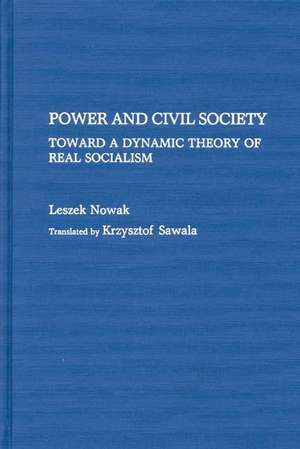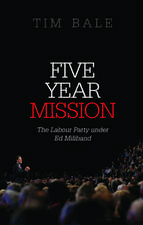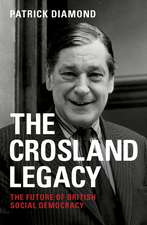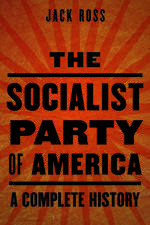Power and Civil Society: Toward a Dynamic Theory of Real Socialism: Contributions in Political Science
Autor Leszek Nowaken Limba Engleză Hardback – 29 apr 1991 – vârsta până la 17 ani
Din seria Contributions in Political Science
- 38%
 Preț: 438.51 lei
Preț: 438.51 lei - 27%
 Preț: 441.64 lei
Preț: 441.64 lei - 28%
 Preț: 436.80 lei
Preț: 436.80 lei - 38%
 Preț: 437.47 lei
Preț: 437.47 lei - 38%
 Preț: 345.58 lei
Preț: 345.58 lei - 24%
 Preț: 460.68 lei
Preț: 460.68 lei - 27%
 Preț: 444.08 lei
Preț: 444.08 lei - 38%
 Preț: 437.84 lei
Preț: 437.84 lei - 22%
 Preț: 231.81 lei
Preț: 231.81 lei - 38%
 Preț: 436.57 lei
Preț: 436.57 lei - 27%
 Preț: 346.07 lei
Preț: 346.07 lei - 27%
 Preț: 345.74 lei
Preț: 345.74 lei - 28%
 Preț: 436.99 lei
Preț: 436.99 lei - 38%
 Preț: 345.30 lei
Preț: 345.30 lei - 28%
 Preț: 437.91 lei
Preț: 437.91 lei - 23%
 Preț: 171.93 lei
Preț: 171.93 lei - 28%
 Preț: 344.63 lei
Preț: 344.63 lei - 27%
 Preț: 437.84 lei
Preț: 437.84 lei - 38%
 Preț: 438.41 lei
Preț: 438.41 lei - 23%
 Preț: 223.20 lei
Preț: 223.20 lei - 28%
 Preț: 437.57 lei
Preț: 437.57 lei - 38%
 Preț: 346.00 lei
Preț: 346.00 lei - 27%
 Preț: 346.50 lei
Preț: 346.50 lei - 28%
 Preț: 438.07 lei
Preț: 438.07 lei - 27%
 Preț: 439.09 lei
Preț: 439.09 lei - 38%
 Preț: 436.99 lei
Preț: 436.99 lei - 28%
 Preț: 435.65 lei
Preț: 435.65 lei - 38%
 Preț: 438.17 lei
Preț: 438.17 lei - 38%
 Preț: 346.25 lei
Preț: 346.25 lei - 23%
 Preț: 229.50 lei
Preț: 229.50 lei - 27%
 Preț: 440.79 lei
Preț: 440.79 lei - 38%
 Preț: 345.83 lei
Preț: 345.83 lei - 38%
 Preț: 438.00 lei
Preț: 438.00 lei - 28%
 Preț: 437.84 lei
Preț: 437.84 lei - 38%
 Preț: 436.99 lei
Preț: 436.99 lei - 27%
 Preț: 438.67 lei
Preț: 438.67 lei - 28%
 Preț: 438.07 lei
Preț: 438.07 lei - 11%
 Preț: 356.63 lei
Preț: 356.63 lei - 28%
 Preț: 438.00 lei
Preț: 438.00 lei - 32%
 Preț: 231.69 lei
Preț: 231.69 lei - 38%
 Preț: 438.41 lei
Preț: 438.41 lei - 28%
 Preț: 461.11 lei
Preț: 461.11 lei - 32%
 Preț: 231.89 lei
Preț: 231.89 lei - 19%
 Preț: 182.01 lei
Preț: 182.01 lei - 38%
 Preț: 436.47 lei
Preț: 436.47 lei - 38%
 Preț: 439.17 lei
Preț: 439.17 lei - 38%
 Preț: 437.07 lei
Preț: 437.07 lei
Preț: 462.45 lei
Preț vechi: 609.30 lei
-24% Nou
Puncte Express: 694
Preț estimativ în valută:
88.49€ • 92.62$ • 73.65£
88.49€ • 92.62$ • 73.65£
Carte tipărită la comandă
Livrare economică 31 martie-14 aprilie
Preluare comenzi: 021 569.72.76
Specificații
ISBN-13: 9780313275050
ISBN-10: 031327505X
Pagini: 248
Dimensiuni: 156 x 235 x 23 mm
Greutate: 0.54 kg
Ediția:New.
Editura: Bloomsbury Publishing
Colecția Praeger
Seria Contributions in Political Science
Locul publicării:New York, United States
ISBN-10: 031327505X
Pagini: 248
Dimensiuni: 156 x 235 x 23 mm
Greutate: 0.54 kg
Ediția:New.
Editura: Bloomsbury Publishing
Colecția Praeger
Seria Contributions in Political Science
Locul publicării:New York, United States
Notă biografică
LESZEK NOWAK is Professor of Philosophy, Adam Mickiewicz University, Poznan, Poland. In 1984 he was expelled from the Department of Philosophy because of cooperation with the Solidarity movement. In 1989 he regained his previous position. Since 1977 he has published four books, in foreign languages only, that deal with aspects of Marxism. He has contributed both chapters and articles to numerous foreign language publications on Social Science and Marxist themes.
Cuprins
PrefaceAssumptions: The Nature of PowerThe Non-Christian Model of ManThe Nature of PowerElementary Models of PowerIdealizing ConditionsEnslavement, Revolution, Satanization: Materialist Model IThe State, and the Organization of Civil Society: Materialist-Institutionalist Model IIIdeology of Power and Citizens' Utopia: Materialist-Consciousness Model IIIGlobal Models of PowerThe Mechanism of AggressionThe Structure and Development of an Empire: Materialist Model IVA Bloc: Materialist Model VSpecial Models of PowerThe Influence of Technological Progress on the Relations of Power: Materialist Model VIPower and Its Forces of Coercion: Materialist Model VIIFactions Within Authority: Materialist-Institutionalist Model VIIIA Certain Historical Approximation: The Development of the Soviet UnionPower and Civil Society in Soviet History: An Interpretation in Terms of Models I-IIThe Social-Political Consciousness. Real Marxism in Real Socialism: An Interpretation in Terms of Model IIIThe Soviet Empire and the Soviet Bloc: An Interpretation in Terms of Models IV-VModels of Socialism and Its History: A DivergenceConclusionsAppendicesBibliographyIndex









